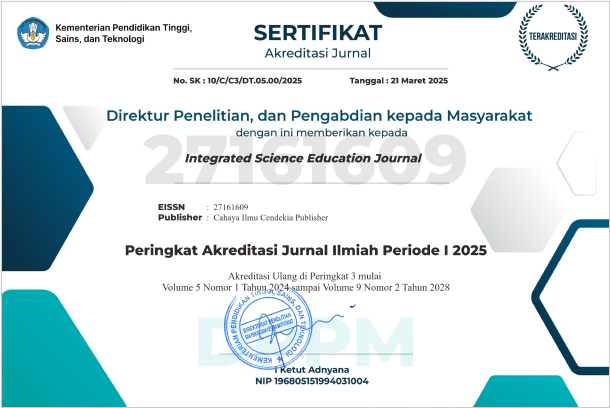Students’ Understanding of Interest in Learning Science
Abstract
Purpose of the study: Describe the trend of shifting student interest in learning science in middle school.
Methodology: This study uses descriptive qualitative and descriptive inquiry approaches in analyzing new trends of student interest in learning science in middle school.
Main Findings: The findings can be concluded that the shift in interest is influenced by technology.
Applications of this study: The results of this study will be useful for the pedagogical realm of teachers in teaching science.
Novelty/Originality of this study: The novelty of this research interest in learning science has changed dramatically with the ease of internet access
References
C. M. Reigeluth. Intructional- Design Theories And Models. New York: Routledge, 2009.
U. Rosidin., & A. Suyatna.,“Teachers and Students Knowledge about Global Warming:a Study in Smoke Disaster Area of Indonesia”, International Journal of Environmental and Science Education, vol. 12, no. 4, pp. 777–786, 2017.
M. P. Lacap. The scientific attitudes of students major in science in the new teacher education curriculum. Asia Pacific Journal of Multidisciplinary Research, vol. 3, no. 5, pp. 7-15, 2015.
R. Trumper. Factors Affecting Junior High School Students' Interest In Physics. Journal Of Science Education And Technology, vol. 15, no. 1, pp. 47-58, 2006.
D. Lucardie., “The impact of fun and enjoyment on adult’s learning”, Procedia - Social and Behavioral Sciences, 439 – 446, 2014
R. M. D. Guido. Attitude And Motivation Towards Learning Physics. Arxiv Preprint Arxiv:1805.02293, 2018.
L. Manasia. Enjoyment Of Learning In Upper Secondary Education. An Exploratory Research. Procedia-Social And Behavioral Sciences, 180, 639-646, 2015.
R. Maharaj-Sharma., & A. Sharma. Using Ict In Secondary School Science Teaching–What Students And Teachers In Trinidad And Tobago Say?. European Journal Of Education Studies, 2017.
S. Al-Rafee., & T. P. Cronan. Digital Piracy: Factors That Influence Attitude Toward Behavior. Journal Of Business Ethics, vol. 63, no. 3, pp. 237-259, 2006.
Korsun. “The Formation of Learnersi Motivation to Study Physics in Terms of Sustainable Development of Education in Ukraine”, Journal of Teacher Education for Sustainability, vol. 19, no. 1, pp. 117ñ128, 2017, DOI: 10.1515/jtes-2017-0008
INadrah., I. Tolla., M. S. Ali., & Muris., “The Effect of Cooperative Learning Model of Teams Games Tournament (TGT) and Students’ Motivation toward Physics Learning Outcome”, International Education Studies; vol. 10, no. 2, 2017, doi:10.5539/ies.v10n2p123
S. Y. Erinosho., “How Do Students Perceive the Difficulty of Physics in Secondary School ? An Exploratory Study in Nigeria”, Int. J. Cross-Disciplinary Subj. Educ., vol. 3, no. 3, pp. 1510–1515, 2013.
J. W. Cresswel. Educational Research: Planning, Conducting, And Evaluating Quantitative And Qualitative Research. New York: Pearson, 2012.
D. M. Gall. Education Research an introduction seventh edition. USA : Pearson Education.Inc, 2003.
L. Cohen., L. Manion., & K. Morrison. Research Methods In Education : Routledge, 2007
A. I. Farooq. Measurement Of Scientific Attitude Of Secondary School Students In Pakista. Academic Research International, 379-392, 2012.
M. A. Ainley. A Cultural Perspective on the Structure of Student Interest in Science. International Journal of Science Education, 51-71, 2011.
Crepaz, Michele, and Marcel Hanegraaff. "The funding of interest groups in the EU: are the rich getting richer?." Journal of European Public Policy 27.1 (2020): 102-121.
Scarborough, J. William., and L. Allyson. Holbook. "The Complexity of Policy Preferences: Examining Self-interest, Group-Interest, and Race Consciousness Across Race and Political Ideology." Social Justice Research (2020): 1-26.
M. M. Chusni., & R. Zakwandi.,“Trend Analysis of Physics Prospective Teachers ’ Research : An Efford To Trend Analysis Of Physics Prospective Teachers ’ Research : An Efford To Improve The Academic”, Jurnal Ilmiah Pendidikan Fisika Al-BiRuNi, 7(1), 10–19, 2018, https://doi.org/10.24042/jipfalbiruni.v7i1.2143
A. Veloo., R. Nor., & R. Khalid. Attitude Towards Physics And Additional Mathematics Achievement Towards Physics Achievement. International Education Studies, vol. 8, no. 3, pp. 35-43, 2015.
O. O Olasimbo. & C. O. Rotimi. Attitudes Of Students Towards The Study Of Physics In College Of Education Ikere Ekiti, Ekiti State, Nigeria. American International Journal Of Contemporary Research, vol. 2, no. 12, pp. 86, 2012.
Kuswanto. Where Is The Direction Of Physics Education? J. Pijar MIPA, vol. 15, no. 1, pp. 59-64,. 2020 DOI: 10.29303/ jpm.v15i1.1226
Ong, Kiah-Ju. "Creative Drama In Science education: The Effects on Situational Interest, Career Interest, and Science-Related Attitudes of Science Majors and Non-Science Majors." EURASIA Journal of Mathematics, Science and Technology Education 16 (2020): 4.
M. A. Ainley.,“A Cultural Perspective on the Structure of Student Interest in Science”, International Journal of Science Education, 51-71, 2011.
Copyright (c) 2020 Cahaya Ilmu Cendekia Publisher

This work is licensed under a Creative Commons Attribution-NonCommercial 4.0 International License.
Authors who publish with this journal agree to the following terms:
- Authors retain copyright and acknowledge that the Integrated Science Education Journal is the first publisher licensed under a Creative Commons Attribution 4.0 International License.
- Authors are able to enter into separate, additional contractual arrangements for the non-exclusive distribution of the journal's published version of the work (e.g., post it to an institutional repository or publish it in a book), with an acknowledgment of its initial publication in this journal.
- Authors are permitted and encouraged to post their work online (e.g., in institutional repositories or on their website) prior to and during the submission process, as it can lead to productive exchanges and earlier and greater citation of published work.







.png)
.png)






